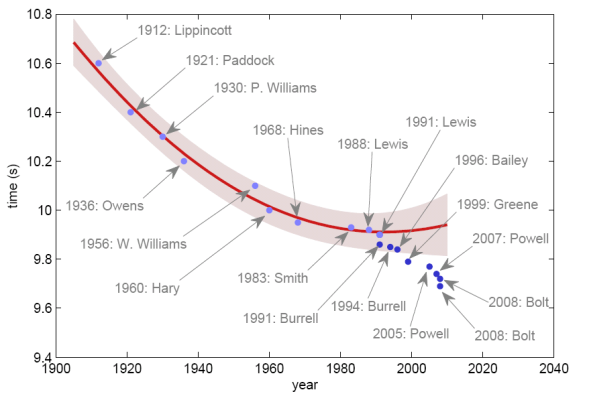100m World Records
and the Secret of the 90s
During the run-up to the 100m finals in the 2008 Olympics in Beijing the media expressed doubt about the cleanness of the competition (with respect to doping, e.g. [1], [2]). This certainly wasn't helped by Bolt's seemingly effortless win which resulted in a new world record on the 100m track [3].
Then I saw a list showing the development of the world records over the 100m from 1912 to now and thought that there are suspiciously many in recent years. So I took that list and made a graph of it:

Shown are the world records as a function of the year that they were first achieved. Note: World records of people who were proven to be doped at the time of the record are not shown. If you look on the development of the world records only until the 80s, it seems that it is following a principle which may be close to the one depicted as a red line. Certainly we can see that the fall of the world record times slowed down. This makes sense, if you assume that there is a natural limit of what a human body can achieve. The red line also suggests that this limit has roughly been hit at the end of the 80s.
But what happened then? In the 90s the world record began to fall further and this development has even picked up since then. Now the world record is falling as quickly as it did in the first half of the 20th century again. So how do we interpret this development? Here are some possible explanations:
- Just a period of slow development in 70s/80s: Between 1936 and 1956 the time for the 100m didn't decrease much either. Maybe it was the same during the 70s and 80s leading us wrongly to believe that we already hit a limit there. Then we have to ask us why there was no development during that time. Was there no interest in the sport, so not engough new talent came through?
- New training methods: With the help of ever improving training equipment and computer aided analysis based on newest scientific results it is possible to identify and develop athletes' strengths better than ever before. The question is whether this is enough to explain the drop in world record times. How much of a difference in milliseconds can perfect training methods make? Ultimately it is still the athlete's body restricting how fast he eventually can run.
- Better development in smaller countries: Maybe new support for sports in non-traditional 100m countries has led to the new fall of world records since the 90s. To some extent the genetics of an athlete determines how fast he can run. That's what people usually call talent. It seems, for example, that Africans are predestined for long-distance runs. However, as long as there is no proper sports development in the right countries, the talent might stay unrecognised. Jamaica might be one of the countries where new support has created great athletes, but this still doesn't explain the development in the 90s, because almost all record holders then were American.
- Doping: Finally, what do you do when you have got the talent and excellent training methods and still can't run any faster, because your body is at its limits? You have to move these limits. Maybe by using substances which increase the level of red blood cells over your natural limit, or let muscles grow stronger than what can be achieved just with training. In this context the plot above suggests that around 1990 athletes started to use doping to push their body limits (and are successful with it) which roughly coincides with when the first doping scandal hit the competition [1].
I know far too little about the development of the sport to make a final judgement about what happened since the 90s. I am convinced that something happened, though, and maybe somebody out there can take it up and clarify more. I certainly believe that there is a limit to how fast a human can run. With doping you might be able to push that limit a bit further. I wonder how far you can eventually go, but I wouldn't want to test it out. Who knows what happens to your muscles when you have pushed them artificially just a little bit too far? Maybe we should ask one of the record holders in 20 years.